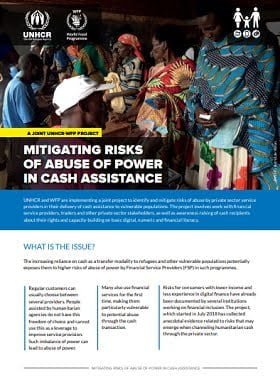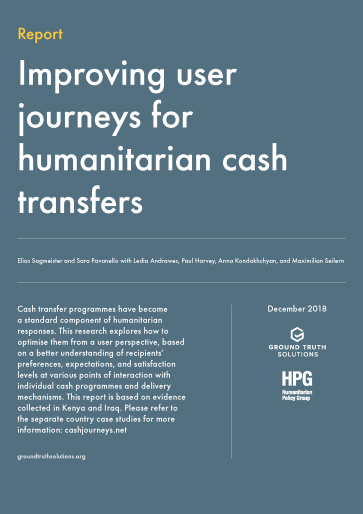Pagos digitales
La tecnología digital está transformando la manera en que respondemos a las emergencias. Las innovaciones abarcan desde cómo identificar a las personas elegibles para recibir asistencia, hasta la recopilación de datos para evaluaciones y monitoreo, así como la comunicación con las comunidades afectadas por situaciones de crisis. Los sistemas de pago digital, incluidos los dispositivos móviles, cupones electrónicos y tarjetas (cuando se utilizan apropiadamente) pueden proporcionar asistencia más oportuna, más segura, más eficaz en relación al costo, y más inclusiva. Sin embargo, a medida que el volumen de los datos personales que recogemos, almacenamos y compartimos sobre la gente crece, debemos garantizar que nuestros sistemas de protección de datos se mantienen al día, y que comprendemos y mitigamos los riesgos inherentes a las nuevas tecnologías.
Últimos recursos

Cash Week 2019: How cash is driving change across the system
Blog Post
Cash Week 2019 aimed to provide a space to reflect, learn, and look ahead, to ensure quality in our use of CVA at scale. The CALP team reflects on the key takeaways from the events that took place around the world, and what they mean for actors within and beyond the humanitarian sector.

CVA and Risks: What happens in the field, stays in the field?
Blog Post
In October 2019 in Douala, Cameroon, the CALP Network facilitated a learning event exploring the risks to beneficiary protection in Cash and Voucher Assistance (CVA). This closed-door workshop, held as part of series of meetings and webinars on theme of CVA and risk in different regions, convened 25...

Consent and Ownership in the Shift to Digital Cash and Voucher Assistance
Blog Post
Part of committing to cash and voucher assistance (CVA) is committing to going digital and collecting data. While they are two different things, they are deeply intertwined. And while an organisation can ‘go digital’ without cash programmes, it’s nearly impossible to commit to cash programmes in the...

Mitigating Risks of Abuse of Power in Cash Assistance – 4 pages
Report
UNHCR and WFP are implementing a joint project to identify and mitigate risks of abuse by private sector service providers in their delivery of cash assistance to vulnerable populations. The project involves work with financial service providers, traders and other private sector stakeholders, as well as...

Lessons in Driving Large Scale Change: the CALP Network’s reflections from the Humanitarian Innovation Exchange
Blog Post
The scaling of cash programming, enabled by mobile money, represents one of the most significant recent innovations in the humanitarian sector. In two guest blogs for Elrha (Enhanced Learning and Research for Humanitarian Assistance), our Director Karen Peachey explores the CALP Network’s role in...

Webinar: Help shape the Future of Financial Assistance report
Event
This webinar presented the scenarios and key issues arising from the CALP Network and IARAN's analysis and invited participants' input, ahead of the publication of the Future of Financial Assistance report

Mitigating Risks of Abuse of Power in Cash Assistance in Afghanistan
Report
This document outlines lessons learned from a joint UNHCR-WFP project in Afghanistan aimed at identifying and mitigating the risks of abuse of power in cash assistance. The cash transfer mechanisms discussed during the mission were cash distribution through Hawalas, mobile token, mobile e-vouchers and...

Data Responsibility: Let’s not wait for another wake up call
Blog Post
This blog is the second in a series on cash and voucher assistance (CVA) and risk. While the first blog busted some myths around misappropriation and fraud in CVA, this second blog looks into a specific risk for recipients of CVA: the risk of misuse of personal data.

Cash is no Riskier than Other Forms of Aid. So Why Do We Still Treat In-kind like the Safer Option?
Blog Post
The first in a new series of blogs on cash and voucher assistance and risk, this article from the CALP Network’s Stefan Bumbacher debunks some common myths around the risk of misappropriation and fraud in CVA.

Guía para la salvaguarda de la niñez en los Programas de Transferencias Monetarias
Guía y herramientas
El propósito de esta guía es determinar los posibles riesgos en materia de salvaguarda de la niñez asociados con los programas de transferencias monetarias y ofrecer ciertas sugerencias durante la gestión dichos programas, (haciendo hincapié en los métodos de seguimiento y mitigación) con el fin de...

Cash and Crises Series Episode I: Digital Money
Video
Cash and Crises is a series of financial literacy audiographics brought to you by CashEssentials, a private sector initiative with a social mission to support the relief and development community in understanding how cash is managed for society in times of crisis. In Episode 1, we start with a short...

The Digital Lives of Refugees: How displaced populations use mobile phones and what gets in the way
Report
GSMA in partnership with UNHCR conducted quantitative surveys and qualitative research to understand the ways in which refugees are using mobile phones in order to help guide digital interventions by humanitarian organisations and mobile network operators. The research identifies key trends, statistics,...

Displaced & Disconnected – Connectivity for Refugees
Report
UNHCR recognizes that one of the ‘hard stops’ in facilitating mobile connectivity and access to finance for displaced populations is non-conducive regulatory environments. In particular, ID-related legal requirements have proven a significant barrier to access. For example, a refugee who cannot...

Unblocked Cash Pilot Full Report
Report
This full report details the project scope, impact and learnings from the Unblocked Cash pilot in Vanuatu. The project was delivered in partnership with Oxfam Australia and ConsenSys, with funds from the Australian Government, and utilised a stablecoin, Dai, as the underlying value .

Kızılaykart Cash Based Assistance, Information Note
Report
Following the first refugee wave in May 2011, refugees from Syria has continued to seek asylum in Turkey. As a result of the open-door policy between 2011 and 2015, Syrians were welcomed by the Turkish government and obtained legal status under temporary protection. Subsequently, Turkey is hosting more...

Mitigating Risks of Abuse of Power in Cash Assistance – Workshop Nairobi, Kenya
Report
UNHCR and WFP are implementing a joint project to identify and mitigate risks of abuse of power by private sector service providers in the delivery
of cash assistance to vulnerable populations. The workshop, held in Nairobi on 10-11 December 2018, followed visits to the first two pilot countries,...

Improving user journeys for humanitarian cash transfers
Report
Humanitarian agencies are increasingly using digital payments, such as mobile money, pre-paid or smartcards, bank cards and electronic vouchers, to deliver cash assistance to affected populations. At the same time, the analysis and use of payment technologies have become more important, as have...

Cash for Shelter in Kenya – A Field Experience
Report
A study of a cash for shelter project in Kalobeyei that highlights how UNHCR uses cash assistance to help the refugees to transition to more durable solutions, in this case, integration with the host community. The project presents a paradigm shift from the traditional refugee camp planning process.

What I learned at the CALP Network’s Celebrating Digital Humanitarian Cash Event
Blog Post
This workshop was a triumphant but sad goodbye to ELAN, the Electronic Cash Transfer Learning Action Network. This was their closing event after four years of hard work, and they leave behind a rather magnificent legacy of tools, guidance, learning, webinars, resources and case studies on how to best...

Cash Week 2018: Looking around and looking ahead
Blog Post
Cash Week 2018 aimed to do two things: challenge us all to think differently about our work and to carve out a space to do so. In this blog, the CALP Network's Sophie Tholstrup reflects on the key debates from the week, and asks how we can build on this momentum and identify new ways of working to meet...


